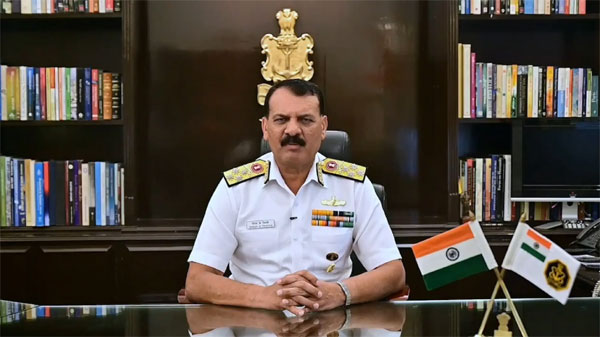Daijiworld Media Network - New Delhi
New Delhi, Oct 28: Emphasising the importance of collaboration and innovation in ensuring maritime security, Indian Navy chief Admiral Dinesh K. Tripathi on Tuesday urged regional partners to adopt collective, cooperative, and technology-driven strategies to tackle emerging challenges in the Indo-Pacific. He was speaking at the inauguration of the 11th Indo-Pacific Regional Dialogue (IPRD) in New Delhi.
Welcoming delegates from over 30 nations, Admiral Tripathi said the Indo-Pacific’s destiny should be “shaped together, through dialogue, cooperation, and mutual trust.”
This year’s theme reflects an evolution in India’s maritime outlook — from SAGAR (Security and Growth for All in the Region) to MAHASAGAR (Mutual and Holistic Advancement for Security and Growth Across Regions) — highlighting New Delhi’s commitment to fostering a secure, inclusive, and resilient maritime order.

Describing the maritime domain as one of “dynaxity” — a blend of dynamism and complexity, Admiral Tripathi identified three major forces shaping the region: commercial disruption, transnational turbulence, and rapid technological change.
He cautioned that global seaborne trade growth is expected to fall to 0.5% in 2025 from 2.2% in 2024, signalling fragility in global logistics. Referring to the Red Sea crisis, he said it had demonstrated how “a single maritime chokepoint can ripple across global freight rates, insurance costs, and food prices.”
Admiral Tripathi also drew attention to illegal fishing, trafficking, and pollution, which endanger livelihoods — particularly in Small Island Developing States (SIDS). Citing UN Food and Agriculture Organisation (FAO) data, he noted that illegal, unreported, and unregulated (IUU) fishing leads to losses of 11–26 million tonnes of fish annually, worth between $10 billion and $23 billion.
He added that smuggling networks exploit weakly governed maritime zones to move narcotics, arms, and sanctioned goods, thereby funding terrorism and spreading instability. Climate change, he warned, has compounded these threats with rising sea levels, extreme weather, and marine pollution adding new layers of risk.
Turning to technology, the Navy chief observed that advances in AI, autonomous platforms, and satellite systems have improved maritime domain awareness but also exposed new vulnerabilities, such as GPS jamming and cyberattacks.
To navigate this complex environment, Admiral Tripathi outlined three strategic pillars:
1. Holistic maritime security
2. Capacity building
3. Capability enhancement
He highlighted the role of the Information Fusion Centre–Indian Ocean Region (IFC-IOR) in Gurugram — which currently hosts 15 international liaison officers and aims to grow to 50 by 2028 — as a cornerstone of regional information-sharing and coordination.
Admiral Tripathi also mentioned India’s joint maritime exercises, such as AIKEYME with African partners and Pacific Reach, alongside indigenous innovations like the NISHAR-MITRA communication terminals for secure naval operations.
He stressed that capacity building must be rooted in partnerships, involving co-design, co-production, and shared maintenance. Under the MAHASAGAR vision, India aims to extend its defence-industrial collaboration to friendly nations, offering affordable technologies and sustainable systems to enhance regional security.
“True capacity,” Admiral Tripathi concluded, “is not measured by what a nation accumulates, but by what a region achieves together.”